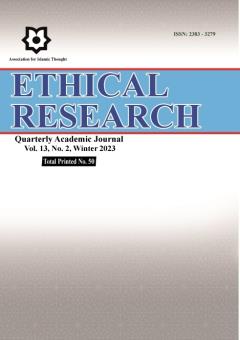Different aspects of anti-habituation and its various manifestations in Ibn Arabi's mystical poems
Subject Areas : Ethics and Islamic Educationshahla norozierad 1 , Naser Hosseini 2 * , ardashir sadraldini 3
1 -
2 - Assistant professor, Department of Arabic language and literature ,mahabad branch ,Islamic Azad university, mahabad ,Iran
3 - Assistant Professor of Arabic Language and Literature, Islamic Azad University, Mahabad Branch, Mahabad, Iran
Keywords: Mystic Journey, Anti-Habituation, Aspects of Anti-Habituation, Ibn Arabi.,
Abstract :
Anti-habituation has been a prominent feature of true mysticism in all ages, and the mystic on two levels of language and meaning, has always adopted devices with wiping the dust of habit, reveal the face of truth and show the contrast between the two. Abandonment of habits and customs and courtesies are necessary conditions for a mystical journey. Mystics’ anti-habituation has shown itself in various fields such as pride, imitation, hereditary prejudices, attention to misconceptions, etc. concerning heretical words uttered in time of spiritual ecstasy, mystics have portrayed the utmost anti-habituation and in a way that is out of the ordinary. In the society, anti-habituation has also found various manifestations, as these kinds of anti-habituations can be seen in the poems of Ibn Arabi. This study has been written in a descriptiveanalytical method with the aim of explaining the various aspects of anti-habituation in Ibn Arabi's mystical poems. The findings indicate that anti-habituation is evident in Ibn Arabi's poems in the form of insight and speech, as well as action and circumstances. And real anti-habituation occurs when it has both characteristics. According to Ibn Arabi, truth emerges when it becomes free of habit, because habit is the greatest cloak in all aspects of human life. In his view, it is necessary to free the human mind from habits, imitation and prejudice so that it sees the truth as it is.
ابن عربی، محی الدین. (۱۴۰۰). انشاء الدوائر. لیدن.
ابن عربی، محمد بن علی. (۱۳۶۷). التجلیات الالهیه.َ تهران: مرکز نشر دانشگاهی.
ابن عربی، محمد بن علی. (1997). الفتوحات المکیه. بیروت: دار صادر.
ابن عربی .(1293)،الفتوحات المکیه،مصر:بولاق
ابن عربی، محمدبن علی.(۱۳۸۸). فصوص الحکم، شرح خواجه محمد پارسا. تهران: مرکز نشر دانشگاهی.
ابن عربی، محمد بن علی. (۱۳۷۵). کتاب المسائل، مقدمه. تصحیح، ترجمه و تعلیق: سید محمد دامادى، تهران: بی نا.
انصاریان، حسین. (۱۳۸۶). عرفان اسلامی. قم: دارالعرفان.
حارث محاسبی،رسالة المسترشدین ،چاپ عبد الفتاح ابوغده،قاهره 1409/1998
حارث محاسبی ،الوصایا،چاپ عبد القادر احمد عطا،قاهره 1384/1965
جامی، عبیدالرحمن. (بی تا). اشعة اللمعات. تهران: گنجینه.
جرجانی، میر سید الشریف. (۱۴۱۱). شرح مواقف. قم: منشورات الشریف الرضی.
زرین کوب، عبدالحسین. (۱۳۵۷). تصوف اسلامی در کمنظر تاریخی آن. ترجمه مجدالدین کیوانی، تهران: سخن.
سجادی، سیدجعفر. (۱۳۷۳). فرهنگ اصطلاحات و تعبیرات عرفانی. تهران: طهوری.
شبستری، شیخ محمود. (۱۳۷۱). مجموعه آثار شیخ شبستری. تهران: طهوری.
شفیعی کدکنی، محمدرضا. (۱۳۸۰). «از عرفان بایزید تا فرمالیسم روسی»، فصلنامه هستی،ش3،ص28-12
عطار نیشابوری، فریدالدین محمد. (۱۳۸۷). تذکرة الاولیاء. تهران: صفی علیشاه.
عمید، حسن. (۱۳۶۸). فرهنگ عمید. تهران: امیرکبیر.
عمیدزنجانی، عباسعلی. (۱۳۷۳). پژوهشی در پیدایش و تحولات تصوف و عرفان. تهران: انتشارات امیرکبیر.
عین القضاة همدانی، عبدالله بن محمد. (۱۳۹۷). نامه ها. تهران: اساطیر.
طریحی، فخرالدین محمد. (۱۳۷۵). مجمع البحرین. ترجمه عذرا مرادی و همکاران. تهران: مهر ظاهر.
قشیری، عبدالکریم بن هوارن. (۱۳۵۹). ترجمه رساله قشیریه، تهران: بی نا.
قیصری، داود. (۱۳۷۵). شرح فصوص الحکم. به کوشش جلال الدین آشتیانی. تهران: انتشارات علمی و فرهنگی.
لاهیجی، شمس الدین محمد. (۱۳۷۱). مفاتیح الاعجاز فی شرح گلشن راز. تهران: زوار.
مجلسی، محمدباقر. (۱۴۰۴). بحار الانوار. بیروت: دار احیاء التراث

